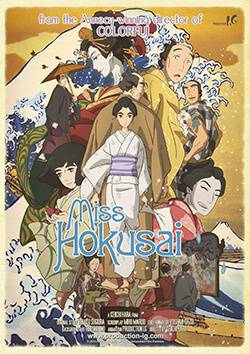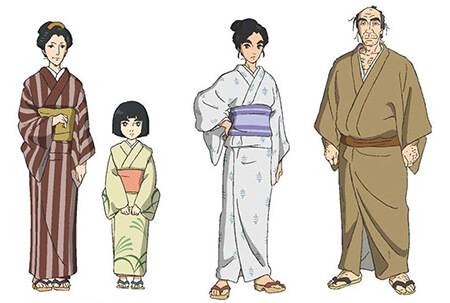Keiichi Hara’s “Sarusuberi: Miss Hokusai” – Review
 Part of the Annecy 2015 feature film official selection, Miss Hokusai (adapted from the manga series Sarusuberi) is the story of O-Ei, the free-spirited, outspoken daughter of the famous Edo-period Japanese painter Tetsuzo Hokusai (most famously known for The Great Wave off Kanagawa). The true story of O-Ei has been adapted into a feature film by Keiichi Hara, who gained Annecy fame winning two awards with 2010’s Colorful.
Part of the Annecy 2015 feature film official selection, Miss Hokusai (adapted from the manga series Sarusuberi) is the story of O-Ei, the free-spirited, outspoken daughter of the famous Edo-period Japanese painter Tetsuzo Hokusai (most famously known for The Great Wave off Kanagawa). The true story of O-Ei has been adapted into a feature film by Keiichi Hara, who gained Annecy fame winning two awards with 2010’s Colorful.
Miss Hokusai is a film that paints a portrait of the Hokusai family as much as O-Ei herself, laying out their complex relationships and human failures as much as celebrating the artwork that came from it. The two main characters are O-Ei and her father. O-Ei works as Tetsuzo’s assistant, helping him with his paintings. She has inherited her father’s talent and stubbornness, and very often paints instead of him, though uncredited. Her artwork is so powerful that it sometimes leads to supernatural trouble.
We’re father and daughter with two brushes and four chopsticks. I guess we can manage, one way or another.
While I have been describing O-Ei as stubborn and outspoken, in the film she is really portrayed as a normal modern woman; it is the time period in which she unfortunately lives that give her these labels and forces her to be tougher. Frustrated with being uncredited for her work even though she is just as talented as her father she wishes to find an agent and to be independent but is unable to as she is a woman. She is incredibly modern in outlook and therefore very relatable for the audience; we can all empathise as she struggles to balance her career with her family commitments and her love life. The traditional Japanese instrumental soundtrack being forgone at her prologue and epilogue for a rock ballad instead magnifies this. You might think that this choice would be jarring, but actually it comes across as very appropriate!
O-Ei is the third of Tetsuzo’s four daughters and born out of his second marriage. While we don’t meet the first two daughters, we do meet the fourth; a blind child named Onao. Because she is blind, Onao is unable to help her father or mother with their work and so she has been sent to a temple to be raised. The relationship between O-Ei and Onao is very sincere and lovely to watch. Throughout the film and O-Ei’s struggles, her visits to Onao act as calming respites that give O-Ei the strength to face the next challenge. Onao is wise beyond her years but still child-like and my favourite moments from the film were those that she was in because she was such a wonderful character. The film was played in Japanese with subtitles but with Onao I’m sure I could have understood without any translation as her physical acting was animated so beautifully. I sometimes find that in anime the animation comes across as stilted, but Onao’s character would not have suited that style and was much more energetically animated.
Onao’s mother and O-Ei visit Onao regularly and love her, but her father never sees her. Tetsuzo’s reluctance to see his youngest daughter creates a lot of friction between himself and O-Ei, providing the greatest impetus for them both to grow as characters, far more so than the supernatural elements that are so under-exaggerated that you almost forget that they are there; what drives the story are the human relationships.

Overall Miss Hokusai proves enjoyable; it achieves what it intends and that is to paint a portrait of the life of O-Ei Hokusai. It made me care for O-Ei’s character very much and the honest portrayals of the family dynamic were very interesting to watch. I did feel however as I often do with anime that the story could be quite plodding at times; in Japanese storytelling there does not need to be the same level of story arc or character growth throughout the film as in the west; Japanese directors are often happy to have a ninety-minute snapshot of a life. In this format you have the chance to get to know the characters very well and you can learn to love them, but it does not have the same momentum or ability to hold you in the story as in a film with a definite story goal or arc. Having said that however, I did really enjoy the film and would recommend it; it’s a wonderful portrait of an amazing woman who lived in 19th century Japan that leaves you feeling both melancholy and uplifted at the same time.
Miss Hokusai won the Feature Film Jury Award at Annecy 2015. For more information on the film visit the production website at productionig.com

